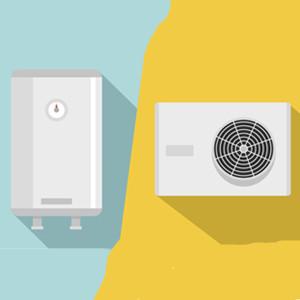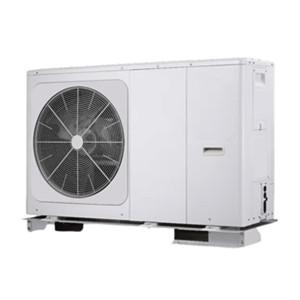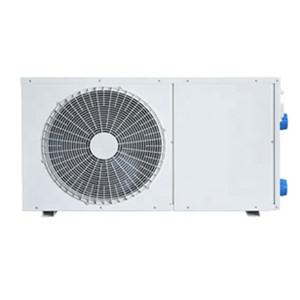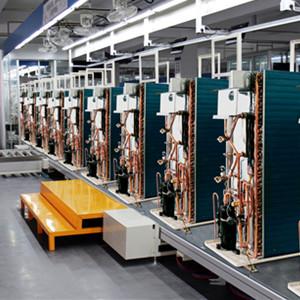Pros and Cons of Heat Pumps
An electric heat pump is a home appliance that can heat and cool a home. They can replace traditional air conditioning and home heating systems such as furnaces, boilers, or inefficient baseboard heating systems.
The main advantage of electric heat pumps compared to other HVAC systems is efficiency. Due to its clever way of working, heat pumps are 2-3 times more efficient than traditional heating systems.
According to our recent analysis, the average homeowner in the U.S. could save $667 per year by switching to a heat pump. Homeowners who switch from electric baseboards, electric furnaces, oil or propane can save nearly $1,000 per year.
Since electric heat pumps do not use fossil fuels, they are also the most environmentally friendly heating and cooling option.
At this point you may be thinking: How can one machine replace both an air conditioner and a furnace?
At the simplest level, a heat pump uses electricity to move heat from one place to another. In cooling mode, the heat pump transfers heat from the home to the outdoors, making the home cooler.
This is no different than how a refrigerator or air conditioner works. These devices pull heat out of the insulated space, making it cooler inside.
But heat pumps can also work in cold climates. So how do these things work on cold days?
Simply put, they basically go into reverse mode, pumping heat energy from the outside air into your home.
This seems a bit counterintuitive. After all, how can an object remove heat from the outside air when it's 20 degrees outside? But remember, heat is just energy. The energy in the air drops all the way to absolute zero, or minus 456 degrees Fahrenheit.
To learn more about how heat pumps transfer energy inside and outside your home, check out our article on how heat pumps work.

Advantages of heat pumps
1. Energy saving
Standard heating systems like furnaces and boilers generate heat by burning fossil fuels or using inefficient electrical resistors. In contrast, a heat pump transfers heat in much the same way as a refrigerator. Therefore, they use much less energy.
Heat pumps—especially mini-split systems—also typically have higher SEER ratings than traditional air conditioners, which means they operate more efficiently in cooling mode.
2. Savings on utility bills
As we mentioned before, the average homeowner can save $667 per year by switching to a heat pump. Homeowners can save nearly $1,000 per year by ditching inefficient systems that run on oil, propane or traditional electric resistance, such as baseboard heat or electric furnaces.
So while a heat pump has a higher upfront cost, the savings typically pay for themselves within 8 to 12 years.
3. More comfortable
In addition to saving money, a heat pump can make your home more comfortable.
During hot and humid weather, a heat pump acts like a whole-home dehumidifier, gradually absorbing moisture from the air. Even if it's not hot (like on a humid fall day), you can run your heat pump as a dehumidifier and keep the temperature at 70 degrees.
In addition to this, many heat pumps are "variable speed," meaning they provide more consistent temperatures than a "single-stage" furnace or air conditioner.
4. Better for the environment
Unlike traditional furnaces and boilers, heat pumps run on electricity. This means that when paired with renewable energy sources such as rooftop or community solar, they can heat your home without heating the earth.
Heat pumps are more energy efficient than other electric heating systems, such as baseboard heaters or electric furnaces. Most heat pumps, especially mini-split air conditioners, have a higher SEER rating than regular air conditioners, which means they will use less energy in cooling mode.
5. No plumbing required
Many homes have no plumbing, making it difficult to install air conditioning. But ductless heat pumps (also called mini-splits) don’t require ducts. They also look and function much better than window air conditioners.
Disadvantages of heat pumps
1. Higher upfront costs
The biggest disadvantage of a heat pump is its higher upfront cost. An inexpensive air conditioning system or furnace costs less than $5,000, while the average cost of a heat pump installation is about $14,000.
Part of the reason for this is that you are purchasing equipment that can replace your heating and cooling system. If you compare a heat pump to a furnace and air conditioner combo, the prices are actually similar.
Many heat pumps also use more advanced technology than cheaper heating and cooling systems, such as variable speed inverters, 20+ SEER ratings, and zone controls.
But we get it. No one likes to spend more money, especially when replacing something that is broken or worn out. Fortunately, many states and utility companies offer rebates and incentives that can help reduce costs.
2. Electrical requirements
Another disadvantage of heat pumps is their higher electrical setup requirements. If you currently have a fossil fuel heating system that runs on natural gas, oil, or propane, you may need to upgrade your electrical panel.
But even if your HVAC technician tells you you need to upgrade your panels, it's worth double-checking. We've heard many stories about one installer quoting $5,000 for necessary electrical work, only to find another installer who found a workaround that cost about $200.
3. Lower performance under extremely cold conditions
Many HVAC installers will tell you that heat pumps don’t work below 30 or 40 degrees Fahrenheit. As we stated in another article, this is wrong. Heat pumps work in cold climates.
But, that being said, if you live in Alaska or North Dakota, a heat pump probably won't save you that much money, at least at today's fossil fuel prices. This is because as the temperature drops, the efficiency of the heat pump decreases.
If you live in a poorly insulated home in a climate that regularly stays below 10 degrees, a dual-fuel system may be better than a stand-alone heat pump. The heat pump can still serve as your air conditioner and mild winter heat, and save the coldest days for the furnace.
Frequently asked questions
1. Is the heat pump noisy?
A common misconception about heat pumps is that they are noisier than other heating and cooling systems. This is not true.
Heat pumps typically operate at about 40-50 decibels, about the same level of quiet as a dishwasher. This is no different than a furnace or traditional air conditioner.
2. Isn’t it expensive to use electricity for heating?
There's no doubt that traditional electric heating systems, such as electric stoves and baseboards, are inefficient. But heat pumps are in a league of their own when it comes to efficiency.
Heat pumps use advanced technology and consume 3-4 times less electricity than traditional heating systems. This is why heat pumps can save many homeowners so much money. Heat pumps use much less energy and have much lower operating costs than oil, propane, and electric resistance heat.
3. Are heat pumps more efficient than traditional air conditioners?
Assuming the heat pump and air conditioner have the same SEER rating, they will use the same amount of electricity each year to cool your home.
But many heat pumps have higher SEER models than typical air conditioners. Unlike central air conditioning, if you choose a ductless mini-split air conditioner, you can only cool the rooms you use. These two advantages make most heat pumps more efficient than standard air conditioning systems.
Check out our heat pump vs. air conditioner article to learn more about the differences.
4. Will a heat pump work in cold weather?
As we mentioned above, a common misconception is that heat pumps don't work in cold climates. This is absolutely not true. Heat pumps can operate at temperatures as low as minus 25 degrees Fahrenheit.
5. What size heat pump should I buy?
We have a complete heat pump selection guide to answer this question. But the simple answer is that you should do an energy audit or a manual J load test to determine how much capacity of a heat pump your home requires.
It's easy to look for simple rules of thumb per square foot. But every home is different. A $200 energy audit is definitely worth it.
Are heat pumps really better for the environment?
Here’s a common question we hear: “If heat pumps run on electricity and our grid runs on fossil fuels, are heat pumps actually better for the planet?”
The short answer is yes. First, heat pumps are more energy efficient than other heating systems. Therefore, even if they are not paired with renewable energy, they produce fewer emissions. Second, heat pumps are the only effective option that can be paired with renewable energy sources like rooftop or community solar.
As a result, heat pumps are more environmentally friendly than any other system today. This advantage grows with every new solar panel and wind turbine.
Another common question is whether leakage emissions of hydrofluorocarbons (HFCs) from heat pumps (and air conditioners) offset CO2 reductions. Overall, heat pumps are better for the environment than any other heating and cooling system.
Get more help
Leomon is a professional heat pump manufacturer. If you are considering purchasing a heat pump, please contact us. Our heat pump experts will give you the best advice.





